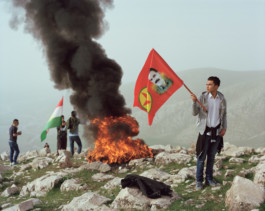
Das Leben ist für uns.
[Life is for us.] North Iraq, 2016
Since the rise of Daesh (Islamic State), global perceptions of the Kurdish people have shifted dramatically. Once a largely overlooked population subjected to decades of repression, they are now recognized as a pivotal force in the fight against terror — represented by a complex web of political and military factions.
Western media outlets began reporting on the growing strike power of Kurdish forces and their strategic successes on the battlefield. The Peshmerga, the official military of the autonomous region of Iraqi Kurdistan, have received international support from countries like the USA, Russia, Germany, and the broader EU. Yet it is the Kurdistan Workers’ Party (PKK) — long designated as a terrorist organization by Turkey, the EU, and the United States — that has emerged as a central, if controversial, player in the conflict with Daesh and the unrest in southeastern Turkey.
The PKK’s ideological reach extends through sister parties and affiliated combat units, including the YPG and YPJ militias in Syria, and guerrilla formations that echo both the HDP’s democratic vision and the PKK’s militant roots.
The documentary project Das Leben ist für uns. offers an intimate look inside the lives and beliefs of PKK members — individuals often dismissed by the West as insurgents, yet deeply committed to a radical political vision. In early 2016, Viktor Hübner traveled to the mountains of northern Iraq, where he spent several weeks with PKK fighters. Through portraits, observations, and in-depth interviews, he sought to explore the layers of ideology, the pressures of war, and the meaning of belonging in a stateless struggle.
Softcover
220-pages, 71 colour pictures
Language: German
Released: July 2016
Self-Published

Intermediate front section at the Tigris near Kirkuk, Iraq

Heavily fortified PKK mound near Kirkuk, Iraq

Makhmur Camp, Iraq

March 8 International Women's Day celebration, Makhmur Camp, Ira

March 8 International Women's Day celebration, Makhmur Camp, Iraq

March 8 International Women's Day celebration, Makhmur Camp, Iraq

Battle and victory of Kurdish women against Daesh, Makhmur Camp,

House of the Sehids, Makhmur Camp, Iraq

Schoolyard in Makhmur Camp, Iraq

Youth club in Makhmur Camp, Iraq

March 21, Newroz festival at the foot of the mountains in Sengaz

March 18, International Day of Struggle for the Release of All Prisoners

March 19, Newroz festival in Makhmur camp, Iraq 01

March 19, Newroz festival in Makhmur camp, Iraq 02

March 21, Newroz festival at the foot of the mountains in Sengaz

March of the guerrillas near Makhmur Camp, Iraq

Guerrillas near Makhmur Camp, Iraq

Daily ideology lessons, near Makhmur Camp, Iraq

Recordings for the internal PKK archive in Makhmur Camp, Iraq

Comrade Rubar Hebun in Makhmur Camp, Iraq

Das Leben ist für uns
[Life is for us.] North Iraq, 2016
Since the rise of Daesh (Islamic State), global perceptions of the Kurdish people have shifted dramatically. Once a largely overlooked population subjected to decades of repression, they are now recognized as a pivotal force in the fight against terror — represented by a complex web of political and military factions.
Western media outlets began reporting on the growing strike power of Kurdish forces and their strategic successes on the battlefield. The Peshmerga, the official military of the autonomous region of Iraqi Kurdistan, have received international support from countries like the USA, Russia, Germany, and the broader EU. Yet it is the Kurdistan Workers’ Party (PKK) — long designated as a terrorist organization by Turkey, the EU, and the United States — that has emerged as a central, if controversial, player in the conflict with Daesh and the unrest in southeastern Turkey.
The PKK’s ideological reach extends through sister parties and affiliated combat units, including the YPG and YPJ militias in Syria, and guerrilla formations that echo both the HDP’s democratic vision and the PKK’s militant roots.
The documentary project Das Leben ist für uns. offers an intimate look inside the lives and beliefs of PKK members — individuals often dismissed by the West as insurgents, yet deeply committed to a radical political vision. In early 2016, Viktor Hübner traveled to the mountains of northern Iraq, where he spent several weeks with PKK fighters. Through portraits, observations, and in-depth interviews, he sought to explore the layers of ideology, the pressures of war, and the meaning of belonging in a stateless struggle.
– Softcover
220-pages,
71 colour pictures
Language: German
Released: July 2016
Self-Published

Intermediate front section at the Tigris near Kirkuk, Iraq

Heavily fortified PKK mound near Kirkuk, Iraq

Makhmur Camp, Iraq

March 8 International Women's Day celebration, Makhmur Camp, Ira

March 8 International Women's Day celebration, Makhmur Camp, Iraq

March 8 International Women's Day celebration, Makhmur Camp, Iraq

Battle and victory of Kurdish women against Daesh, Makhmur Camp,

House of the Sehids, Makhmur Camp, Iraq

Schoolyard in Makhmur Camp, Iraq

Youth club in Makhmur Camp, Iraq

March 21, Newroz festival at the foot of the mountains in Sengaz

March 18, International Day of Struggle for the Release of All Prisoners

March 19, Newroz festival in Makhmur camp, Iraq 01

March 19, Newroz festival in Makhmur camp, Iraq 02

March 21, Newroz festival at the foot of the mountains in Sengaz

March of the guerrillas near Makhmur Camp, Iraq

Guerrillas near Makhmur Camp, Iraq

Daily ideology lessons, near Makhmur Camp, Iraq

Recordings for the internal PKK archive in Makhmur Camp, Iraq

Comrade Rubar Hebun in Makhmur Camp, Iraq